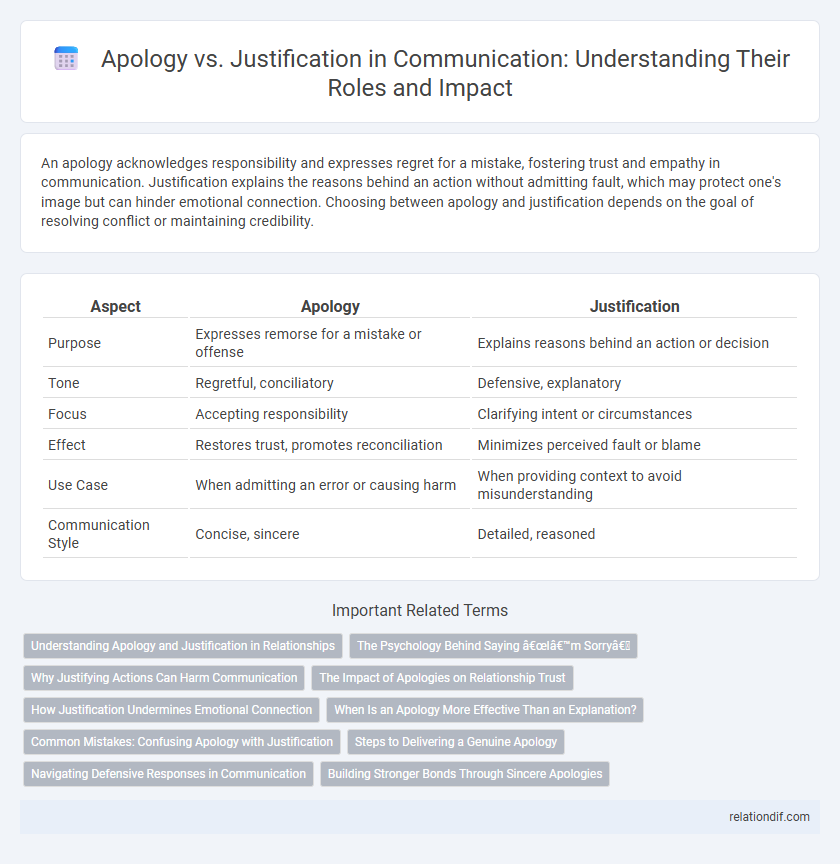An apology acknowledges responsibility and expresses regret for a mistake, fostering trust and empathy in communication. Justification explains the reasons behind an action without admitting fault, which may protect one's image but can hinder emotional connection. Choosing between apology and justification depends on the goal of resolving conflict or maintaining credibility.
Table of Comparison
| Aspect | Apology | Justification |
|---|---|---|
| Purpose | Expresses remorse for a mistake or offense | Explains reasons behind an action or decision |
| Tone | Regretful, conciliatory | Defensive, explanatory |
| Focus | Accepting responsibility | Clarifying intent or circumstances |
| Effect | Restores trust, promotes reconciliation | Minimizes perceived fault or blame |
| Use Case | When admitting an error or causing harm | When providing context to avoid misunderstanding |
| Communication Style | Concise, sincere | Detailed, reasoned |
Understanding Apology and Justification in Relationships
Understanding apology and justification in relationships enhances emotional clarity and trust. An apology acknowledges responsibility and expresses regret, fostering empathy and reconciliation. A justification explains actions without necessarily admitting fault, which can clarify intentions but may also hinder emotional repair if perceived as deflecting blame.
The Psychology Behind Saying “I’m Sorry”
Expressing "I'm sorry" activates empathy and repair mechanisms in interpersonal communication, signaling acknowledgment of a mistake and concern for the other person's feelings. The psychology behind apology involves reducing cognitive dissonance and restoring trust by validating the impact of one's actions. Unlike justification, which often triggers defensiveness, sincere apologies promote emotional healing and stronger relational bonds.
Why Justifying Actions Can Harm Communication
Justifying actions often shifts the focus from understanding emotions to defending behavior, which can hinder empathetic communication. This defensive stance may create barriers to genuine dialogue, reducing trust and openness between parties. Recognizing the impact of justification enables more effective conflict resolution and strengthens interpersonal relationships.
The Impact of Apologies on Relationship Trust
Apologies significantly enhance relationship trust by demonstrating accountability and empathy, fostering emotional repair and mutual understanding. Unlike justifications, which may deflect responsibility, sincere apologies validate the feelings of the injured party and promote reconciliation. Studies show that trust restoration is more effective when apologies include acknowledgment of harm and a commitment to change.
How Justification Undermines Emotional Connection
Justification often shifts the focus from acknowledging the other person's feelings to defending one's actions, which can create emotional distance and hinder empathy. When individuals justify their behavior instead of offering a sincere apology, it may convey a lack of understanding or concern, weakening trust and rapport. This defensive stance interrupts genuine emotional connection and can escalate conflicts rather than resolving them.
When Is an Apology More Effective Than an Explanation?
An apology is more effective than an explanation when the primary goal is to restore trust and acknowledge responsibility for a mistake. In emotional or interpersonal conflicts, expressing sincere regret helps to validate feelings and mend relationships faster than providing reasons or excuses. Apologies prioritize empathy and accountability, which are crucial for healing and effective communication.
Common Mistakes: Confusing Apology with Justification
Confusing apology with justification often undermines effective communication by diluting the sincerity of the expression of regret. An apology should clearly acknowledge responsibility and express remorse, while a justification tends to shift blame or provide excuses, which can escalate conflicts. Recognizing this distinction improves interpersonal trust and conflict resolution by fostering genuine understanding and empathy.
Steps to Delivering a Genuine Apology
Delivering a genuine apology involves acknowledging the specific mistake or harm caused, expressing sincere regret without excuses, and taking responsibility for the impact of one's actions. Clear communication requires using empathetic language to validate the feelings of the affected party and offering reassurance that corrective measures will be taken. Finalizing the apology with a commitment to change fosters trust and helps rebuild damaged relationships effectively.
Navigating Defensive Responses in Communication
Apologies effectively reduce defensiveness by acknowledging responsibility and showing empathy, which fosters trust and open dialogue. Justifications often trigger defensive responses because they can be perceived as excuses, potentially escalating conflicts and inhibiting resolution. Clear communication balances sincere apologies with explanations to navigate defensive reactions and promote understanding.
Building Stronger Bonds Through Sincere Apologies
Sincere apologies foster trust and deepen relationships by acknowledging mistakes without deflecting responsibility. Unlike justifications, which can create defensiveness, genuine expressions of regret promote empathy and mutual understanding. This authenticity in communication strengthens emotional connections and builds lasting bonds.
Apology vs Justification Infographic

 relationdif.com
relationdif.com